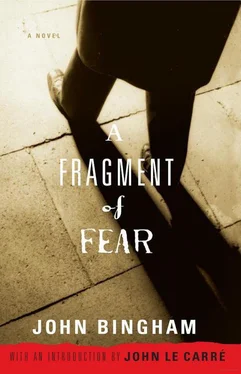John Bingham - A Fragment of Fear
Здесь есть возможность читать онлайн «John Bingham - A Fragment of Fear» весь текст электронной книги совершенно бесплатно (целиком полную версию без сокращений). В некоторых случаях можно слушать аудио, скачать через торрент в формате fb2 и присутствует краткое содержание. Жанр: Триллер, на английском языке. Описание произведения, (предисловие) а так же отзывы посетителей доступны на портале библиотеки ЛибКат.
- Название:A Fragment of Fear
- Автор:
- Жанр:
- Год:неизвестен
- ISBN:нет данных
- Рейтинг книги:3 / 5. Голосов: 1
-
Избранное:Добавить в избранное
- Отзывы:
-
Ваша оценка:
- 60
- 1
- 2
- 3
- 4
- 5
A Fragment of Fear: краткое содержание, описание и аннотация
Предлагаем к чтению аннотацию, описание, краткое содержание или предисловие (зависит от того, что написал сам автор книги «A Fragment of Fear»). Если вы не нашли необходимую информацию о книге — напишите в комментариях, мы постараемся отыскать её.
A Fragment of Fear — читать онлайн бесплатно полную книгу (весь текст) целиком
Ниже представлен текст книги, разбитый по страницам. Система сохранения места последней прочитанной страницы, позволяет с удобством читать онлайн бесплатно книгу «A Fragment of Fear», без необходимости каждый раз заново искать на чём Вы остановились. Поставьте закладку, и сможете в любой момент перейти на страницу, на которой закончили чтение.
Интервал:
Закладка:
So the peasant quickened his steps, poor optimistic ignoramus, and within a few days of my return to England I went down to Burlington, Sussex.
There is nothing unusual about the Bower Hotel, Burlington-on-Sea. It stands as it has stood for eighty years, gazing mournfully at the Channel across the narrow promenade.
To the right and left of it other grey buildings were dripping in the rain when I went down there. Some of them were small and did not aspire to the title of hotel. All of them, with one or two exceptions, provided a bed and food of a sort for those who wished to live or stay at Burlington. There was a surprising number of such people. Some came voluntarily there to spend their holidays, because it had a strip of sand for children, at least when the tide was low, and a short pier, a few cinemas and two dance halls.
Others, elderly people, lived in the hotels and boarding houses for as long during the year as they were permitted to do so. Most of them curried favour with the proprietors and thought they were popular with them, and so they were to some extent, particularly in winter, since they paid the running costs of the establishment. Had it not been for the permanent residents, as they were politely called, the proprietors would have had to close each autumn, and engage fresh staff each spring, which is no small problem.
But when spring and summer arrived, the love of the proprietors for their permanent residents wore thin. Most of the residents couldn’t afford to pay high summer prices for their rooms. Most of them weren’t allowed to stay on, even if they could.
Elderly residents can only pay rent while they are alive. They don’t live for ever. If they hang around occupying their rooms all the summer how does the place get known? What about fresh blood, and particularly holiday-makers’ blood?
Thus argued Miss Constance Brett, I learned, who ruled the Bower Hotel like an eastern potentate, and wasn’t much tougher, some said, than an old bayonet scabbard.
So every Easter or Whitsun there was an exodus from Burlington. It consisted of the old, the frail, the lame and the impoverished; and all over the country relatives prepared spare rooms, and proprietors of crumby places inland partially aired the damp beds in preparation for the Burlington refugees.
In the autumn the residents were allowed to come back and sometimes even occupy their old rooms. In return for the privilege of paying out good money, they could forget the worries of the summer. They had been taken back.
Familiar rooms, surroundings, and faces made it seem like home. They were grateful, and often said so, which was more than the proprietors ever did, because it is bad policy to unbend too much with subject races such as permanent residents.
The Bower Hotel, owing to the grey stones of which it was built, and its architecture, must have looked sad from the moment when the first Victorian customer crossed the threshold. It gave the impression of a hotel which never wanted to be there. In this it was deceptive, like some of the staff, and some of the residents. For unlike its seedier neighbours, which were mere converted houses, the Bower had been built as a hotel in the first place. So had the George Hotel, further along the promenade, and the Cliff Hotel, above the town, but they were giants, with American Bars and orchestras, and in a different class altogether.
Nevertheless, the Bower had class, too, of its kind. It lay back a few yards from the road and there was a short drive with an entrance for cars marked IN, and another marked OUT.
Inside the metal-studded front door, there was a reception-desk on the right, where a grey-haired, bespectacled woman, called Miss Banks, appeared to pore over ledgers from eight o’clock in the morning until six o’clock at night, with an hour off for lunch. Framed on the wall above Miss Banks’ head was an embroidered sampler which those arrivals who had only known the exterior of the hotel regarded with some astonishment:
A thing of beauty is a joy for ever;
Its loveliness increases; it will never
Pass into nothingness; but still will keep
A BOWER quiet for us, and a sleep
Full of sweet dreams, and health, and quiet breathing.
John Keats
On the left of the entrance hall was the hall porter’s desk, with railway time-tables and brochures, and behind the porter’s stool a series of pigeon-holes for letters and keys.
The hotel was heavily carpeted throughout, and comfortably furnished, and most of the rooms had central heating. Even the food was reasonable. So that despite its melancholy exterior it was snug inside. Miss Brett, who had been running it for nineteen years, knew her job. Most of her residents were allowed to stay during the summer if they could afford the increased seasonal prices, though not all, and she saw to it that their creature comforts were well attended to.
Above all, she kept them warm. Too warm for a casual visitor like myself. My mother lived in a very different type of hotel near Brighton, friendly and cheerful, on the outside as well as inside, with plenty of daylight flooding in through the big windows, and here, too, I have found the heat somewhat overpowering. But then elderly people have thin blood.
Food is taken seriously at these hotels, and though hardly any of the residents take any exercise, most of them eat four meals a day and have a tin of biscuits by the bedside to keep them going till dawn. During the two nights and three days I spent at the Bower I learned that the only bad mistake Miss Brett ever made in her early days was to try to economise on food. The complaints nearly cost her her job.
The Bower Hotel, with its overheated rooms and sombre exterior, was not merely a home for many. It was a kind of club where each member treated the others with politeness and dignity, where each had a secure niche of greater or lesser importance.
It was easy for me to feel patronising about this little community but I tried not to. The club was a refuge from loneliness and despair for a vanishing generation ill suited to modern conditions.
It was an enclave in which there were smooth waters, where sails were easily trimmed to any light breezes which might from time to time arise. Such thunder as was heard came only distantly, from the noisy, brash, modern hinterland, and any lightning was of the harmless, flickering summer type.
The Bower Hotel was not fitted to withstand forked lightning of the killer variety.
I arrived in time for lunch, and sought an interview with Miss Constance Brett immediately after the meal.
She was a heavily built woman of about fifty, with iron grey hair cut in an old-fashioned bobbed style, a muddy complexion, a square face, and pale blue eyes. She was dressed in a brown blouse, a dark grey cardigan, a skirt of a lighter grey, thick beige stockings, low heeled shoes, and wore a single row of large, cheap, pink, artificial pearls.
The big square ashtray on her desk by the window was half filled with cigarette stubs. I judged her a woman whom no man had loved. The hotel was her empire. Her living-room, which was half-office, and the bedroom, which I glimpsed through a partly opened door, was her home. The respect of her staff and the flattery of the residents were her substitutes for affection.
I explained to her my purpose, adding for good measure that in my view the case was unlikely to be solved, and I wished to write about it for criminological interest and record, perhaps in a book of unsolved murders, under the heading of The Pompeiian Murder.
“I knew Mrs. Dawson only slightly, but she told me how happy she had been at the Bower,” I said, to try and soften her up. I could have saved myself the trouble.
“This is very irregular you know,” Miss Brett said abruptly.
Читать дальшеИнтервал:
Закладка:
Похожие книги на «A Fragment of Fear»
Представляем Вашему вниманию похожие книги на «A Fragment of Fear» списком для выбора. Мы отобрали схожую по названию и смыслу литературу в надежде предоставить читателям больше вариантов отыскать новые, интересные, ещё непрочитанные произведения.
Обсуждение, отзывы о книге «A Fragment of Fear» и просто собственные мнения читателей. Оставьте ваши комментарии, напишите, что Вы думаете о произведении, его смысле или главных героях. Укажите что конкретно понравилось, а что нет, и почему Вы так считаете.












